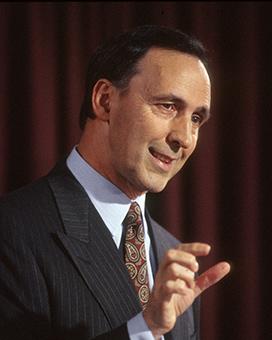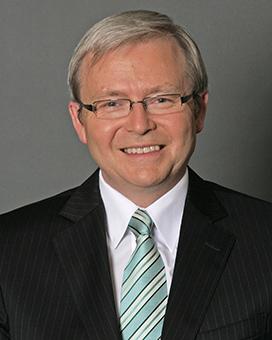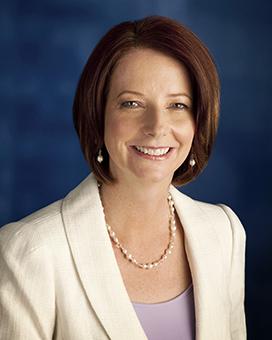On this page
1970 to 1979
18 May 1974: 1st elected to Federal Parliament
Howard was elected as Member of Parliament for the seat of Bennelong (NSW), in the 29th federal election.
19 Nov 1977: Treasurer
Howard was sworn in as Treasurer in Malcolm Fraser’s Coalition government.
1980 to 1989
5 Sep 1985: Leader of the Opposition
After the resignation of Andrew Peacock as leader of the Liberal Party, Howard won a leadership ballot and became party leader and Leader of the Opposition. Howard lost the leadership in 1989 before he returned to the role on 30 January 1995.
1990 to 1999
11 Mar 1996: 25th Prime Minister
After victory in the 38th federal election on 2 March, the 1st Coalition government for 13 years was sworn in, with John Howard as prime minister.
28 Apr 1996: Port Arthur massacre
A gunman killed 35 people at Port Arthur, Tasmania. 12 days later, Howard announced a scheme for uniform gun laws throughout Australia. A buy-back of privately owned guns was funded by a special levy on taxpayers.
11 Dec 1996: Telstra on sale
The Bill enabling the share market sale of half of Telstra passed both Houses of Parliament. This was achieved after Senator Mal Colston left the Labor Party and, with Independent Brian Harradine, held the balance of power in the Senate.
23 Dec 1996: Wik native title
The full High Court determined that pastoral leases did not extinguish native title. Howard proposed a ‘10-point plan’ in April 1997 in an attempt to allay pastoralists’ concerns about the implications of the judgment.
1 Jan 1997: Restructuring industrial relations
Most of the provisions of the Workplace Relations Act 1996 came into effect. Under the Act, the Industrial Relations Act 1988 was substantially amended. Jurisdiction of the Industrial Relations Court of Australia, established in 1994, was transferred to the Federal Court of Australia from 25 May 1997.
11 Apr 1997: One Nation
Pauline Hanson launched a new political party in Ipswich, Queensland, promoting tighter restrictions on immigration. Hanson had won the seat of Oxley in the 1996 federal election as an Independent, after she had failed to gain Liberal preselection.
26 May 1997: Sorry business
In Parliament, Howard tabled the Human Rights and Equal Opportunity Commission’s report on the separation of Aboriginal and Torres Strait Islander children from their families, Bringing Them Home.
13 Feb 1998: Constitutional Convention
At the conclusion of 10 days of deliberations, 116 appointed delegates and 36 elected delegates voted that a proposal for a republic with a president appointed by Parliament be put to the people. At the referendum held on 6 November 1999, Australians rejected this model.
30 Aug 1998: SEA-ME-WE-3
A new intercontinental communications optical fibre cable system able to transfer 20GB of data per second was completed. It accelerated Internet access in Australia and partner countries including Indonesia, Japan, Hong Kong, United States and United Kingdom. The cable runs ashore through the sand dunes of Floreat Beach in Western Australia.
3 Oct 1998: 39th federal election
The Coalition under Howard retained government, although with a reduced majority.
19 Apr 1999: Special envoy
Former prime minister Malcolm Fraser was appointed special envoy of the Australian Government to seek release of CARE Australia workers Steve Pratt and Peter Wallace imprisoned in Yugoslavia.
16 Jul 1999: New environmental protection
Enactment of the Environment Protection and Biodiversity Conservation Act repeals the 1975 legislation.
20 Sep 1999: East Timor crisis
An Australian contingent of 2500 troops arrived in Dili to lead a United Nations peacekeeping team in East Timor. This followed violent disruption after an overwhelming vote for independence from Indonesia on 30 August. The United Nations Transitional Administration in East Timor (UNTAET) took charge 6 days later to disarm pro-Indonesia militias and provide shelter, food, and medical aid to the East Timorese people.
6 Nov 1999: Referendum
Australians rejected a proposal to establish the Commonwealth of Australia as a republic and the proposed insertion of an additional preamble to the Constitution.
3 Dec 1999: Law of the sea
The Federal Court upheld the validity of native title in the sea and the seabed around Croker Island in the Northern Territory. The government had appealed a decision of the Native Title Tribunal set up under the Native Title Act 1996.
2000 to 2009
1 Jul 2000: A new tax
A goods and services tax was introduced as part of the government’s tax reform program aimed at redressing the effects of declining revenue from income tax.
25 Jul 2000: Relations with North Korea
Diplomatic relations resumed between North Korea and Australia. An ambassador from the Democratic People’s Republic of Korea presented his credentials in Canberra. 3 weeks earlier an Australian ambassador had been received in Pyongyang.
15 Sep 2000: Sydney Olympic Games
The Governor-General opened the 2nd Olympic Games held in Australia. Sydney’s successful bid for the ‘Green Games’ involved transforming the polluted wasteland of Homebush Bay into a world standard Olympic Park. Among the records broken at the Games was the number of passengers carried on 1 day by Sydney’s ferries, exceeding the previous record set on 1 January 1901.
1 Jan 2001: Centenary of Federation
The celebration of Australia’s 100th birthday began in Sydney’s Centennial Park, the site of the inauguration ceremonies on 1 January 1901. On 9 May, the opening of the 1st parliament was commemorated at a special sitting of Parliament in Melbourne’s Exhibition Building.
29 Jun 2001: 23rd Governor-General
Anglican Archbishop Dr Peter Hollingworth became Australia’s Governor-General, the 1st minister of religion appointed to the vice-regal post.
7 Aug 2001: Census question 50
The national census measuring Australia’s population 100 years after Federation took place. Respondents were asked to decide whether their names and addresses would be retained for release in 99 years. Some 52% agreed, the rest maintaining Australia's tradition of an anonymous census.
29 Aug 2001: Tampa crisis
A Norwegian ship rescued refugees fleeing repressive regimes in Afghanistan and the Middle East from their sinking boat in the Indian Ocean. It then crossed into Australian waters despite the refusal of entry by the Australian government. The refugees were taken to security holding camps in the Pacific while their eligibility for political asylum was assessed.
11 Sep 2001: War on Terror
Afghanistan-based Al-Qaeda terrorists flew hijacked United States airliners into the twin towers of the World Trade Centre in lower Manhattan, and into the Pentagon, the US Defence Department headquarters near Washington DC. A 4th airliner crashed before nearing its apparent target, the White House. The death toll was 3000. Howard, then in Washington, agreed to support US President George W Bush in the world’s first ‘war on terrorism’.
10 Nov 2001: 40th federal election
The Coalition under Howard retained government, with a slightly increased majority.
4 Mar 2002: Zimbabwe
The Commonwealth Heads of Government Meeting at Coolum (Queensland) established a 3-person committee to work with the Commonwealth Secretary-General to determine the appropriate Commonwealth responses to Zimbabwe’s democratic shortcomings. Howard was 1 of the 3 members of the committee, along with the Presidents of Nigeria and South Africa. On 19 March, the committee decided to suspend Zimbabwe from the Councils of the Commonwealth.
20 May 2002: Independent East Timor
The proclamation of East Timor’s autonomy followed the vote to end Indonesian rule in 1999. The 1st elections were held on 1 August 2001 and an 88-member Constituent Assembly was elected on 30 August 2001. In presidential elections on 14 April 2002, independence leader Xanana Gusmao became East Timor’s 1st president.
12 Oct 2002: Bali bombing
A terrorist bombing at a nightclub in Kuta (Bali, Indonesia) killed 202 people, nearly half of them Australian.
18 Mar 2003: Commitment of Australian forces to Iraq
The government agreed to a request by the President of the United States that Australian forces join the coalition acting to enforce Iraq’s compliance with resolutions of the United Nations Security Council relating to the possession of weapons of mass destruction. Approximately 2000 Australian Defence Force personnel were deployed in the Middle East.
28 May 2003: Resignation of the Governor-General
The Queen accepted the resignation of Dr Peter Hollingworth as Governor-General. The Governor of Tasmania, Sir Guy Greene, served as Administrator of the Commonwealth until the appointment of a new Governor-General.
22 Jun 2003: 24th Governor-General
Major General Michael Jeffery was appointed Governor-General. He had served as Governor of Western Australia from 1993 to 2000.
25 Jun 2004: National Water Initiative
The Council of Australian Governments (COAG) agreed to a National Water Initiative and the establishment of a 7-member National Water Commission.
13 Aug 2004: Australia-United States Free Trade Agreement
Legislation implementing the AUSFTA was passed by the parliament, concluding a lengthy process of negotiation that had taken place in 2003 and early 2004. The agreement came into operation on 1 January 2005.
9 Oct 2004: 41st federal election
The Coalition under Howard retained government with an increased majority.
26 Dec 2004: Tsunami
On Boxing Day, a tsunami brought major devastation and loss of life to 11 countries, including Indonesia, Sri Lanka, the Maldives and Thailand. An Australia-Indonesia Partnership for Reconstruction and Development was formed to assist Indonesia’s recovery.
1 Jul 2005: Senate majority
The Senators elected at the 41st federal election took their seats, giving the Liberal-National coalition a majority in both chambers.
15 Sep 2005: Telstra sale
The Senate passed the Telstra (Transition to Full Private Ownership) Bill 2005. With the Governor-General’s assent on 23 September, the Telstra Corporation, Australia’s telecommunications agency, could be fully organised. The 1st sale had been in 1997, under the Telstra (Dilution of Public Ownership) Act 1996 which enabled the sale of up to one-third of the agency, with $1 billion of the revenue to be allocated to environmental programs.
1 Oct 2005: Indonesian terror attack
More than 20 people are killed and over 120 injured when 3 suicide bombers set off a blast in Bali, the most serious incident since the 2002 bombing.
27 Mar 2006: WorkChoices
The final element in the restructuring of industrial relations initiated by the Workplace Relations and Other Legislation Amendment Act 1997 was introduced, the WorkChoices policy. This restructuring had also replaced the former Commonwealth Employment Service with a competitive market of private employment service businesses.
8 Sep 2007: APEC in Australia
Opening of the Asia-Pacific Economic Cooperation Forum in Sydney, with a special Protective Security Coordination Centre coordinating tight security measures through its APEC 2007 Security Branch. The breach of a security cordon by TV satirists The Chasers led to criminal charges that were later dismissed, and international enjoyment of their unexpectedly successful comedy stunt.
24 Nov 2007: 42nd federal election
The Coalition under Howard was defeated with a significant swing toward the Labor Party under Kevin Rudd. Howard lost his own seat of Bennelong to Labor candidate Maxine McKew, becoming the 2nd Prime Minister in Australian history to be defeated in their own electorate.
30 Nov 2007: Left office
After the Coalition’s electoral defeat, Howard resigned as prime minister. This took effect on 3 December, when the new Rudd Labor government was sworn in.
12 Dec 2007: Left Parliament
Howard formally conceded the loss of his seat on 12 December 2007, 2 weeks after the election.





